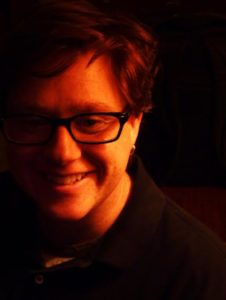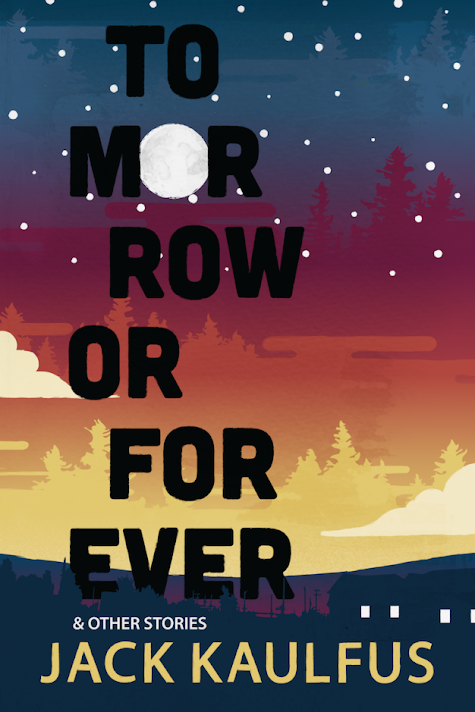 In Jack Kaulfus’s debut story collection, Tomorrow or Forever, the Austin-based author examines life, the afterlife, and the identities we may take on in those spaces and beyond. These nine stories move through a variety of settings, from the cramped inside of a plane to a mystical small town sculpture garden, painting backdrops that are alternately recognizable and otherworldly. In these eclectic stories, tension lies between what’s known and unknown—about the worlds we exist in and about our very selves. That tension gives the pieces a sense of lingering darkness, not for lack of hope, but because of imperfect humanity. Here, Kaulfus talks about writing toward what feels magical, making characters face their fears, and the sense of freedom that writing fiction provides a writer.
In Jack Kaulfus’s debut story collection, Tomorrow or Forever, the Austin-based author examines life, the afterlife, and the identities we may take on in those spaces and beyond. These nine stories move through a variety of settings, from the cramped inside of a plane to a mystical small town sculpture garden, painting backdrops that are alternately recognizable and otherworldly. In these eclectic stories, tension lies between what’s known and unknown—about the worlds we exist in and about our very selves. That tension gives the pieces a sense of lingering darkness, not for lack of hope, but because of imperfect humanity. Here, Kaulfus talks about writing toward what feels magical, making characters face their fears, and the sense of freedom that writing fiction provides a writer.
—
Nicole Beckley: Can you tell me a little about the origins of the collection? What was the first story that you remember writing for it?
Jack Kaulfus: The first story I wrote was called “Troglodytes.” It’s about a woman who has been married and then she breaks up with her husband and starts working in this weird archeological thing where she’s putting together the bones. It’s the first story that I remember writing that I thought, okay, this is a real story.
NB: What made you think it was a “real” story?
JK: I just remember feeling like it had two characters who I could portray both going through something that was very different and put them in this same situation in the same workplace and watch them have an interaction. Where I wasn’t just writing about one person’s ideas, which would be me, or someone I thought I knew well. I felt like it had more depth and that it also got to that kind of weird magical place that I’m always trying to get to. The magical place wasn’t necessarily a fantasy world; it could be real or could not be real and it didn’t really matter which one.
 NB: As you started building the collection, did you feel like certain themes were emerging, or were you writing toward some sort of connective tissue between the stories?
NB: As you started building the collection, did you feel like certain themes were emerging, or were you writing toward some sort of connective tissue between the stories?
JK: What I tried to do was think about how a particular character is, or how characters confront the things they’re most afraid of. And then what happens when they do, or what happens if they don’t do it. In this collection, most of those things are negative, like when they do confront the thing they’re most afraid of, good things are not necessarily going to happen.
NB: They’re afraid of them for a valid reason.
JK: Yes, for valid reasons. But I hope to take them in a direction where there might be a story afterward for them and it’s not just then they die.
NB: I think those ideas work specifically in the story “The End of Objects.” It’s such an interesting story because the characters are in the afterlife, but they’re figuring out what’s going to happen in their next version of life. Where did the concept for that story come from?
JK: I read this story [“The First Several Hundred Years Following My Death”] by this writer named Shawn Vestal in Tin House. His concept of the afterlife is so compelling to me, I think I’ve sort of taken it on as my own, what I would like my afterlife to be; it’s really weird. But I started thinking in terms of the afterlife, if there is reincarnation and we don’t get what we want, what could be a fair system? Or what could give people a chance and give people enough of a choice, to where we’re still stuck here on earth not knowing what the hell’s going on, but there’s a lamp that we might have chosen for ourselves that we might feel a special attachment to, but we don’t know why. And, especially in terms of trans people, I think about this all the time, just, what if this wasn’t my reality? What if I could just not think about this anymore?
NB: In general, do you have a standard approach to how you start a story? Is there a concept or image or something that you start with?
JK: There’s usually a concept and a character. It’s usually a concept that I’ve been really trying to think about in my own life, and deal with. Whether that be my mother almost dying, what would it have been like if she had died? It’s usually a problem or something that I can’t stop thinking about in my own life, and then I’ll formulate some sort of character who’s just a thinly veiled proxy for myself and move forward with that.
NB: Oh you mean writing?
JK: Just in general, writing. Yeah.
NB: There’s this moment in the title story where the main character says, “Look, this is what I was trying to tell you earlier,” I say. “I think I’m not who you think I am.” And Mike, another character, responds, “Nobody is who you think.” That seemed to me to be such an interesting statement about identity, and so many of these characters are considering their own identities. Do you think of storytelling as a way to talk about identity or the complexity of our identities?
JK: A lot of the stories are about trans characters, and I myself have a tendency to perseverate on my own experience, my own isolation, my own fear. And when I went back and looked through some of these stories, I wanted to focus on a trans experience in some ways, but in other ways I wanted it to be less specific, so that there was an inroad enough to each character that you could figure out that they were also working on some identity stuff, too.
NB: Some writers talk about writing as a discovery process, writing to figure out how you feel about something or discover something new. Is there something you discovered while you were writing these stories?
JK: That’s a hard one, because the first story was written around 2008, and ever since then I’ve been piecing them together. In putting the book together though, it forced me to really consider whose story can I tell. When I first started writing, I had no problem writing from the perspective of a trans woman. I was like, sure, I’m trans, no big deal. Now, I am more reluctant, not that I have to write every character from my particular perspective, but I do wonder about that. A few trans women have read “The End of Objects” and have really liked it, but one of my friends was like, “this is the hardest thing I’ve ever had to read. Why did you do this?” It really made me think, and so we had a real conversation about it, about the things that were really disturbing to her. Maybe that particular perspective is not necessarily mine to explore. So, I’m just really thinking about that and talking with people about the way that we tell trans stories. I think that part of the discovery process has been important for me, and I’m interested in seeing where that takes me.
NB: It’s interesting to hear people’s reactions. A while ago, somebody gave you a two-star review on Goodreads, well before the book’s release date.
JK: I was like two stars already, damn. I mean, I’m not excepting a blow up, but. . . Somebody pointed out that maybe it was a bot, but I like to think of my friend Liam there, as being honest. Like, I read your stories, they’re not very good. It relaxed me a little bit, just knowing right out of the gate, don’t expect five stars. Or even three.
NB: Some of the stories use sci-fi-type elements. Is there an advantage to writing in the sci-fi space while thinking about identity?
JK: Yes, I definitely think so. I think it frees up so much exploratory territory. I already feel like I’m walking around in this fictional universe where I don’t really know what’s true, and I don’t really understand how to figure out what’s true, because we’re humans and we lie and we do our best to just survive. And, also, we’re changing the whole time. So I definitely feel like allowing there to be a little breathing room between reality and fantasy or a non-reality. That feels more true to me than just writing straight fiction.
NB: The book is being published by Transgress Press. How did you get connected to them?
JK: Paige Schilt, who wrote Queer Rock Love, introduced me to Trystan Cotten [the Managing Editor] at the Outsider Fest, where my band was playing. I sent [my writing] and within six weeks he was like, I’m liking the stories already, I’m going to send you a preliminary contract. Just for giving me the chance, they’ve opened up so much, so I just want to go out there and introduce [the press to] as many people as I can.
Jack Kaulfus is a trans writer living in Austin, Texas. Jack holds an MFA from Texas State University, and teaches high school English and creative writing. Their writing has appeared in Cappella Zoo, Heavy Feather Review, and Off the Rocks, among others. Tomorrow or Forever is their first collection.
Nicole Beckley is a writer and performer whose work has appeared in the New York Times, 7×7, Tribeza, and the Onion AV Club, as well as in many small theaters and on at least one public access channel. She’s at work on a linked story collection titled Perfect Miss. She holds a B.A. in Urban Studies and Communications from Stanford University and currently lives in Austin, TX.